On Peacebuilding and Statebuilding
Statebuilding and peacebuilding are two prominent policy agendas that are driving efforts – both nationally and internationally – to address conflict and fragility and to lay a foundation for human sustainable development around the world. My research, teaching and policy related work in this area seeks to contribute to enhanced understanding of these concepts and policy agendas historically and contextually, and to more reflective, effective practice today. Particular themes I'm focused on concern the critiques of of externally led, top-down, templated approaches to peacebuilding and statebuilding that are at odds with commitments to nationally owned and endogenous processes, and the critical alternatives that exist and are emerging - notably situated in hybrid systems and structures that reflect the realities of dynamic transitional societies.
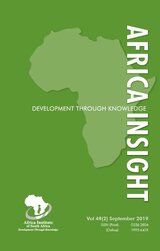
Beyond liberal and local peacebuilding: Alternatives for addressing the complexity of conflict and fragility in Africa
Africa Insight, 49(3) December 2020
Publisher website / email me for complementary copy
The search for more relevant and effective approaches to building and sustaining peace, preventing violent conflict and reducing fragility is on, with growing cognisance of the failures and limitations of liberal peacebuilding and the ‘local turn’. This paper explores critiques of these and lessons arising in the context of the ever-increasing complexity of the conflict-fragility-violence landscape. Three conceptual and practical framings are examined: endogenous hybridity; transformation; and resilient social contracts. These framings have emerged in the last decade in the peacebuilding field and wider interdisciplinary scholarship and policy arenas. The paper argues that these three framings reflect both realities and aspirations on the ground in Africa, and are giving rise to practical and relevant pathways that hold promise for achieving and sustaining peace.
Africa Insight, 49(3) December 2020
Publisher website / email me for complementary copy
The search for more relevant and effective approaches to building and sustaining peace, preventing violent conflict and reducing fragility is on, with growing cognisance of the failures and limitations of liberal peacebuilding and the ‘local turn’. This paper explores critiques of these and lessons arising in the context of the ever-increasing complexity of the conflict-fragility-violence landscape. Three conceptual and practical framings are examined: endogenous hybridity; transformation; and resilient social contracts. These framings have emerged in the last decade in the peacebuilding field and wider interdisciplinary scholarship and policy arenas. The paper argues that these three framings reflect both realities and aspirations on the ground in Africa, and are giving rise to practical and relevant pathways that hold promise for achieving and sustaining peace.
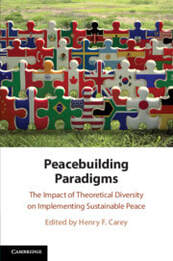
Generations of Constructing Peace: The Constructivism Paradigm and Peacebuilding,
Co-authored with Tim Donais
Peacebuilding paradigms: The impact of theoretical diversity on implementing sustainable peace, H.F. Carey, ed., Cambridge: Cambridge University Press, 2020.
Publisher website
Peacebuilding Paradigms focuses on how seven paradigms from the Comparative Politics, International Relations, and Policy Analysis subfields - Realism, Liberalism, Constructivism, Cosmopolitanism, Critical Theories, Locality, and Policy - analyze peacebuilding. The contributors explore the arguments of each paradigm, and then compare and contrast them. This book suggests that a hybrid approach that incorporates useful insights from each of these paradigms best explains how and why peacebuilding projects and policies succeed in some cases, fail in others, and provide lessons learned. Rather than merely using a theoretical approach, the authors use case studies to demonstrate why a focus on just one paradigm alone as an explanatory model is insufficient. This collection directly at how peacebuilding theory affects peacebuilding policies, and provides recommendations for best practices for future peacebuilding missions.
Co-authored with Tim Donais
Peacebuilding paradigms: The impact of theoretical diversity on implementing sustainable peace, H.F. Carey, ed., Cambridge: Cambridge University Press, 2020.
Publisher website
Peacebuilding Paradigms focuses on how seven paradigms from the Comparative Politics, International Relations, and Policy Analysis subfields - Realism, Liberalism, Constructivism, Cosmopolitanism, Critical Theories, Locality, and Policy - analyze peacebuilding. The contributors explore the arguments of each paradigm, and then compare and contrast them. This book suggests that a hybrid approach that incorporates useful insights from each of these paradigms best explains how and why peacebuilding projects and policies succeed in some cases, fail in others, and provide lessons learned. Rather than merely using a theoretical approach, the authors use case studies to demonstrate why a focus on just one paradigm alone as an explanatory model is insufficient. This collection directly at how peacebuilding theory affects peacebuilding policies, and provides recommendations for best practices for future peacebuilding missions.
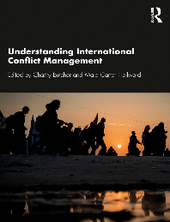
Peacebuilding
Understanding International Conflict Management, eds. C. Butcher and M.C. Hallward.
London: Routledge. 2020
This chapter examines the history of peacebuilding as a mechanism for international conflict management, exploring the evolution of multiple generations of peacebuilding: structural, liberal, integrated, hybrid, and local approaches. Through the case of Liberia it reflects on these generations of peacebuilding in practice. It then discusses contemporary challenges facing peacebuilding – including the interactions between conflict, fragility and violence, as
well as the role of atavistic nationalism and populist movements that attack the rules-based system upon which many peacebuilding efforts are based. It closes with consideration of promising directions in peacebuilding, including the rising international commitment to prevention, sustaining peace, and inclusion in peace processes.
Understanding International Conflict Management, eds. C. Butcher and M.C. Hallward.
London: Routledge. 2020
This chapter examines the history of peacebuilding as a mechanism for international conflict management, exploring the evolution of multiple generations of peacebuilding: structural, liberal, integrated, hybrid, and local approaches. Through the case of Liberia it reflects on these generations of peacebuilding in practice. It then discusses contemporary challenges facing peacebuilding – including the interactions between conflict, fragility and violence, as
well as the role of atavistic nationalism and populist movements that attack the rules-based system upon which many peacebuilding efforts are based. It closes with consideration of promising directions in peacebuilding, including the rising international commitment to prevention, sustaining peace, and inclusion in peace processes.
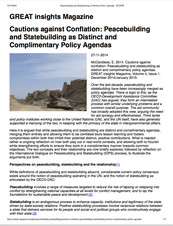
Cautions against Conflation: Peacebuilding and Statebuilding as Distinct and Complementary
Policy Agendas
GREAT insights, V4: N1, December 2014/January 2015
This short article critiques the tendency of policy-makers to conflate the concepts and practices of peacebuilding and statebuilding in international affairs. It makes the case for their distinctness to be nurtured in scholarship, policy and practice as a means of ensuring the important contributions of both are realised.
Policy Agendas
GREAT insights, V4: N1, December 2014/January 2015
This short article critiques the tendency of policy-makers to conflate the concepts and practices of peacebuilding and statebuilding in international affairs. It makes the case for their distinctness to be nurtured in scholarship, policy and practice as a means of ensuring the important contributions of both are realised.
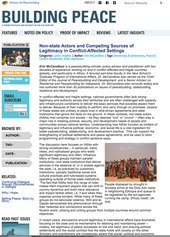
Non-state Actors and Competing Sources of Legitimacy in Conflict-Affected Settings
Building Peace, Alliance for Peaceuilding's online forum for peace and security
September 2014
In conflict-affected and fragile settings, national governments often lack strong legitimacy and authority across their territories. They are often challenged by powerful non-state actors that hold high levels of legitimacy with some populations, who may be performing needed services that the state cannot deliver. The article argues the need for greater attention towards engaging concepts, tools and arrangements that hold potential to reconcile competing sources and narratives of legitimacy in support of building and sustaining peaceful states.
Building Peace, Alliance for Peaceuilding's online forum for peace and security
September 2014
In conflict-affected and fragile settings, national governments often lack strong legitimacy and authority across their territories. They are often challenged by powerful non-state actors that hold high levels of legitimacy with some populations, who may be performing needed services that the state cannot deliver. The article argues the need for greater attention towards engaging concepts, tools and arrangements that hold potential to reconcile competing sources and narratives of legitimacy in support of building and sustaining peaceful states.
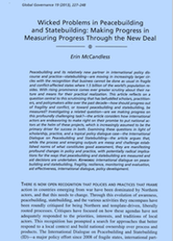
Wicked Problems in Peacebuilding and Statebuilding: Making Progress in Measuring Progress Through the New Deal
Global Governance, V19: N2, 2013
This article reflects on the central question ―how should progress out of fragility and conflict, or toward peacebuilding and statebuilding, be measured? Investigating a related question―are we making progress on this profoundly challenging task?―the article considers how international actors are endeavoring to make right on their promise to put national actors at the helm of these projects, which is increasingly assumed to be the primary driver for success in both. In particular, the article critically reflects upon the New Deal for Engagement in Fragile States. The New Deal is a framework endorsed by fragile countries and partners to promote country-owned and country-led mechanisms to support transition out of fragility.
Global Governance, V19: N2, 2013
This article reflects on the central question ―how should progress out of fragility and conflict, or toward peacebuilding and statebuilding, be measured? Investigating a related question―are we making progress on this profoundly challenging task?―the article considers how international actors are endeavoring to make right on their promise to put national actors at the helm of these projects, which is increasingly assumed to be the primary driver for success in both. In particular, the article critically reflects upon the New Deal for Engagement in Fragile States. The New Deal is a framework endorsed by fragile countries and partners to promote country-owned and country-led mechanisms to support transition out of fragility.
Editorials on peacebuilding and statebuilding
Vertical integration: A dynamic practice promoting transformative peacebuilding
McCandless, E., Abitbol, E. & Donais, T. (2015). JPD, 10(1), 1-9.
Editorial - open access
The evolving landscape of infrastructures for peace
Tongeren, P.V., Ojielo, O. & Brand-Jacobsen, K., McCandless, E. & Tschirgi, N. (2012). JPD, 7(3), 1-7.
Editorial - open access
Hybridity and Policy Engagement
McCandless, E. & Tschirgi, N. (2012). JPD, 7(2), 1-2.
Editorial - open access
Cooperation for reconstruction, peace and transformation in Haiti: Critical reflections to advance aid effectiveness McCandless, E. & Abu-Nimer, M. (2011). JPD, 6(3), 1-2.
Editorial - open access
Security for people? The role of SSR in sustaining peace
McCandless, E. & Abu-Nimer, M. (2007). JPD 3(2), 1-6.
Editorial - open access
National ownership in security, peacebuilding and development: Grassroots activism, institution building and policymaking McCandless, E. & Abu-Nimer, M. (2006). JPD, 2(3), 1-6.
Editorial - open access
Building socially accountable peace and development in Africa
McCandless, E. & Abu-Nimer, M. (2004). JPD, 2(1), 1-5.
Editorial - open access
McCandless, E., Abitbol, E. & Donais, T. (2015). JPD, 10(1), 1-9.
Editorial - open access
The evolving landscape of infrastructures for peace
Tongeren, P.V., Ojielo, O. & Brand-Jacobsen, K., McCandless, E. & Tschirgi, N. (2012). JPD, 7(3), 1-7.
Editorial - open access
Hybridity and Policy Engagement
McCandless, E. & Tschirgi, N. (2012). JPD, 7(2), 1-2.
Editorial - open access
Cooperation for reconstruction, peace and transformation in Haiti: Critical reflections to advance aid effectiveness McCandless, E. & Abu-Nimer, M. (2011). JPD, 6(3), 1-2.
Editorial - open access
Security for people? The role of SSR in sustaining peace
McCandless, E. & Abu-Nimer, M. (2007). JPD 3(2), 1-6.
Editorial - open access
National ownership in security, peacebuilding and development: Grassroots activism, institution building and policymaking McCandless, E. & Abu-Nimer, M. (2006). JPD, 2(3), 1-6.
Editorial - open access
Building socially accountable peace and development in Africa
McCandless, E. & Abu-Nimer, M. (2004). JPD, 2(1), 1-5.
Editorial - open access
